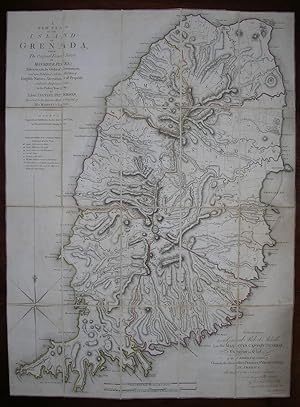Descripción
Fine folding engraved map (32 ¼ x 24 inches). Laid down on cartographic linen in 20 sections, showing the island of Grenada in detail, the title and key upper left, dedication to Lieut. General Robert Melvill lower right, scale center along bottom edge, decorated with a large compass rose, with original hand coloring in outline (a bit thumbed). Provenance: Manuscript title and ownership inscription of Hugh Percy, 2nd Duke of Northumberland (1742-1817) on verso. WONDERFUL MAP OF GRENADA FROM LIBRARY OF HUGH PERCY, 2ND DUKE OF NORTHUMBERLAND, BRITISH OFFICER IN THE AMERICAN REVOLUTION First edition. This large-format, very detailed map includes all landholdings, elevation, and water courses, as well as all the main towns, cities, and ports of Grenada. The key includes symbols for "Sugar Mills drove by Water," "Sugar Mills drove by Cattle," "Great Coffee or Cocoa Plantations," "Small Ditto," and "Pottery or Tile Kilns." Partner of Thomas Jeffreys, London's leading mid-18th century engraver, William Faden assumed sole control of the business after his colleague's death and continued Jeffreys's tradition of producing the finest quality engraved maps and atlases. Faden's fine engravings, in fact, made him one of the greatest cartographers of the 18th century. Faden's talent for mapmaking was such that he was named official geographer to the king in 1775, just five years before he produced this map. Hugh Percy, 2nd Duke of Northumberland, was a British peer and politician, and an officer in the British army during the American Revolution: "In 1763 and again at the 1768 general election, Percy was elected, unopposed, an MP for Westminster. In the Commons he supported the Grenville ministry, and in February 1766 he voted against the repeal of the Stamp Act.[Percy] departed with his regiment in May 1774 for service in North America. He watched with increasing dismay as the situation deteriorated in New England: 'this Country', he told his father on 12 September, 'is now in as open state of Rebellion as Scotland was in the year 45' (Percy papers, vol. L, pt A, fol. 16). When at length hostilities began at Lexington and Concord on 19 April 1775 Percy played a crucial role in saving Lieutenant-Colonel Smith's force from destruction as it retreated to Boston. Percy's brigade, together with two field pieces, met Smith's beleaguered column on the road between Menotomy and Lexington. Percy's troops held the enraged Massachusetts militiamen at bay while Smith's men regrouped, and then escorted Smith's battered command back to Boston under heavy fire. His coolness was widely praised, and he became the hero of the hour in besieged Boston. In July 1775 he was appointed major-general in America, and in September major-general in the army. "In 1776 Percy was involved in the campaign in and around New York. After the British victory on Long Island (27 August 1776) he wrote that the Americans 'will never again stand before us in the Field. Things seem to be over with Them & I flatter myself now that this Campaign will put a total End to the War' (Letters, 69)-a misjudgement, but one shared by many of his colleagues. He took part in the storming of Fort Washington on 16 November 1776, and at the beginning of December he went with General Clinton on the expedition to occupy Newport, Rhode Island. In January 1777 Clinton left Rhode Island for England, leaving Percy in charge of the garrison. "Over the next few weeks Percy's relationship with General Sir William Howe (1729-1814), the British commander-in-chief in America, rapidly deteriorated. Percy complained at Howe's decision to reduce the number of troops under his command in order to reinforce the army operating in New Jersey. He was further aggrieved when Howe pressed him to send a large quantity of forage to New York, which Percy believed could not be spared. When Howe criticized a civil appointment that Percy had made on Rhode Island, then reversed the decision of a court martial over which Percy. N° de ref. del artículo 72MMS24
Contactar al vendedor
Denunciar este artículo
![]()

